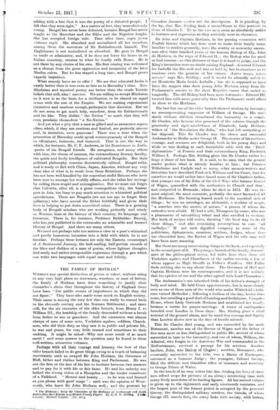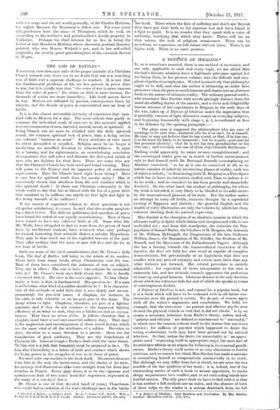THE FAMILY OF HOTHAM.
Warlotyr any special distinction of genius or talent-, without rising to any very high place as statesmen, warriors, or men of letters, the family of Hotham have done something to justify their chronicler's claim that throughout the history of England there have been "few public events of importance in which they did not figure." They have also made some mark on English society. Their name is among the very few that can really be traced back to the eleventh century and the Norman Settlement ; and rarer still, for the six centuries of the elder branch, from Henry I. to WilliamUl., the headship of the family descended without a break from father to son or grandson. And the succession was almost always of men of some note, Yorkshire squires, soldiers, Church- men, who did their duty as they saw it in public and private life, in war and peace, for very little reward and 'sometimes to their undoing. It might be asked—Why not more result of so much merit ? and some answer to the question may be found in these well-written, attractive volumes.
Perhaps with all their courage and honesty the best of that elder branch failed to do great things owing to a touch of balancing uncertainty such as swayed Sir John Bottum, the Governor of Hull, hither -and thither between King and Parliament. He was not the first or the last of his line to hesitate between two masters and to pay for it with life or fair fame. He and his unlucky son lacked the strong vision of a Hampden and the tender conscience of a Falkland. "Honest-and hearty . . . to be won and framed as you please with good usage " : such was the-opinion of Went- worth, who knew Sir John 'Hotham well ; and the portrait by • .Tie*Wormer being lie Chronicles of dB Bathos. of Brorborough end-Booth Baffin. from their Bitkorto onpublishal Fancily Papas. By .t. 31. W. Stirling. 4 vela London Herbert Jenne, /24s. net./ Cornelius Janssen carries out the description. It is puzaling, by the by, that Mm. Stirling finds a resemblance in this portrait to those of Chalice I. To us the two moo seem as absolutely unlike in features and expression as they certainly were in character.
Sir John and Captain Hotham, in the passing connexion with English history which has done most to make their family name familiar to readers generally, were the worthy or unworthy sueces- sora after three hundred years of the famous Bishop of Ely, John de Bothnia, in the reign of Edward II. ; the Bishop who for good or bad reasons—at this distance of time it is hard to judge, and the King's favourites were no doubt ruining England—deserted Edward for Isabella the She-wolf and was so held by her fascinations as to condone even the greatest of her crimes. 'Ingres teems, mares tnieurs I says Mrs. Stirling ; and it would be absurdly unfair to set Henrietta Maria beside Isabella ; but site is supposed to have been the magnet that drew young John Hethani away from the Parliament's service to the short Royalist career that ended so tragically. The old Bishop had been more fortunate t Edward III. treated Ides with more generosity than the Parliament could afford to show to the Hothams.
The last but silo of the elder branch showed wisdom by becoming an uncompromising supporter of William of Orange. His son's death without children transferred the baronetcy to a cousin, Sir Charles, who became also possessed of the estates through the generosity and rightmindedness of Elisabeth, Lady Bethel°. widow of " the Revolution Sir John," who had left everything mit her disposal. This Sir Charles was the clever and successful Ambassador to Berlin under George U. The stories of his coolness, courage, and resource are delightful, both in his young days and while he was dealing at such formidable odds with the " Devil. diplomatists" of Prussia and their extraordinary King, Frederick William I. Perhaps Mrs. Stirling gives this Sir Charles rather too large a share of her book. It is said, to be sure, that the general reader prefers what Is already familiar to him t but Princess Wilhelmine and Carlyle and so many other memoir-writers and historians have described Frederick William and his Court, that for ourselves we would rather have heard mom of Sir Chariots's father,
that younger son of Sir John of the Civil Wars who became 11 g.er of Wigan, quarrelled with the authorities in Church and Slat:•, and emigrated to Bermuda, where he died in 1672. He was the most original, the most eccentric, probably the most learned of all the Hothams. His learning leaned much to the mystical side of things ; he was an astrologer, an alchemist, a student of magic, " a searcher into the secrets of nature," a person of whom the orthodox were afraid. He had a wife, Thompson by name, who was a pharmacist of astonishing talent and also excelled in cookery. Her book of recipes still exists, showing " the beast way to do all these things," and also containing prescriptions to cure "all malladys." If not such dignified company as some of the politicians, diplomatists, courtiers, soldiers, Judges, whose lives are chronicled here, the Rector of Wigan and his wife may well have been more amusing.
But there are many entertaining things in the book, and especially in tire second part of it. The younger branch of the family, doseend • ants of the philosophical rector, led wider lives than those old Yorkshire squires and Churchmen of the earlier records, a few of whom appear as High Sheriffs in Fuller's Worthies. Old Fuller finds nothing else to say about them. The Governor of Hull and Captain Hotham were his contemporaries, and it is not unlikely that his opinion of one and the other agreed with Lord Clarendon's.
The Ambassador's son inherited little of his father's streugth of body and mind. He held Court appointments, but is more clearly seen as one of those men of the world who under ‘Vhitefielit's influ- ence turned Methodist ; following a fashion of the day, better than some, but entailing a good deal of humbug and foolishness. Campdet
House, where Lady Gertrude Hotham had established her f became a centre for prayer-meetings. A terror of earthquake. brooded over London in those days Mrs. Stirling given a vivid amount of the general alarm, met by much less courage and dignity than London shows now in the face of hostile aircraft, This Sir Charles died young, and was succeeded by his uncle Beaumont, another son of the Rector of Wigan and the father of five sons more or lees distinguished in public life, several of whom succeeded in turn to the baronetcy, and one of whom, William, the Admiral, who fought in the American War and commanded in the Mediterranean, received a peerage for his services. Another brother, John, was Bishop of (Uglier; another, Beaumont, who eventually succeeded to the title, was a Baron of Exchequer, esteemed as a humane Judge ; the youngest, Colonel George, filled the difficult and thankless office of treasurer and secretary to George Prince of Wales.
In the hands of an easy writer like Mrs. Stirling the lives of these men afford scope for pictures of an always interesting time with many lively anecdotes of its leading figures. All her:second volumes is given up to the eighteenth and early nineteenth centuries, and the largest part of the former period is occupied by the /miscued history, the distinguished military services, the friends, of whom George M. stands first, the many links with society, with letter,,,
with the stage and the art world generally, of Sir Charles Hotham, the eighth Baronet, Sir Beaumont's eldest son. For some years this gentleman bore the name of Thompson, which he took on succeeding to his mother's and grandmother's family property in Yorkshire. Perhaps his chief interest for us lies in being the father of that Henrietta Hotham whose charming portrait Romney painted, who was Horace Walpole's pet, and in her self-willed originality the worthy groat-granddaughter of the eccentric Rector of Wigan.



































 Previous page
Previous page